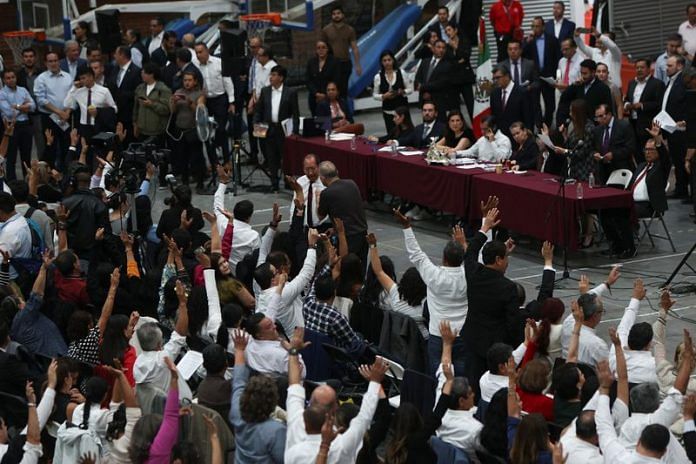MEXICO CITY (Reuters) -In a marathon session, Mexico’s lower house of Congress on Wednesday morning approved a controversial judicial reform, a crucial step towards cementing a key ambition of outgoing President Andres Manuel Lopez Obrador and setting the tone for the next administration.
Despite an opposition outcry, ruling party Morena approved the reform, which has led to a strike by judicial workers, strained relations with the United States and generated concern in financial markets.
The lower house debate began on Tuesday afternoon and lasted more than 12 hours before it was passed with 359 votes in favor and 135 votes against. It will now move to the Senate for further debate, where it is expected to be approved due to Morena’s strong majority.
The backbone of the constitutional reform calls for the election by popular vote of more than 7,000 judges and magistrates, including the Supreme Court.
Lopez Obrador has argued the reform is necessary to hold judges accountable and reduce corruption.
The reform, supported by President-elect Claudia Sheinbaum, Lopez Obrador’s protégé, proposes reducing the number of Supreme Court judges to nine from 11, reducing their terms to 12 years and cutting required work experience by half to qualify for ministerial positions.
Critics, however, have said the reform will not impact prosecutors, police and public ministries, which they blame as the real culprits of impunity and corruption.
The Congress session began on Tuesday afternoon after a six-hour delay and was relocated to a sports complex in Mexico City after judicial workers blocked the entrance to the lower house in protest.
Supreme Court judges also voted to join a work stoppage that has seen thousands of judicial workers go on strike, the court said in a statement. Supreme Court judges are currently nominated by the president and then affirmed by the Senate.
Opponents criticised the single-session debate and passage as a rush job, saying that lawmakers should have taken more time to discuss the reform.
Francisco Burgoa, a Constitutional law specialist at the National Autonomous University of Mexico (UNAM), said it was “alarming and deeply outrageous” that Morena and allied lawmakers pushed to debate and approve the reform in the span of a day.
“This violation of democratic procedures reflects a regression that threatens to destroy our constitution, the division of powers, constitutional democracy and particularly the judiciary,” Burgoa said.
The reform has generated concern among investors and the U.S. ambassador to Mexico, who worry it would weaken a crucial check and balance of the executive branch and damage the business climate in Latin America’s second-largest economy.
(Reporting by Raul Cortes Fernandez, Diego Ore and Natalia Siniawski; additional reporting by Lizbeth Diaz; Writing by Cassandra Garrison and Aida Pelaez-Fernandez; Editing by Sarah Morland, Cassandra Garrison and Sandra Maler)
Disclaimer: This report is auto generated from the Reuters news service. ThePrint holds no responsibilty for its content.



